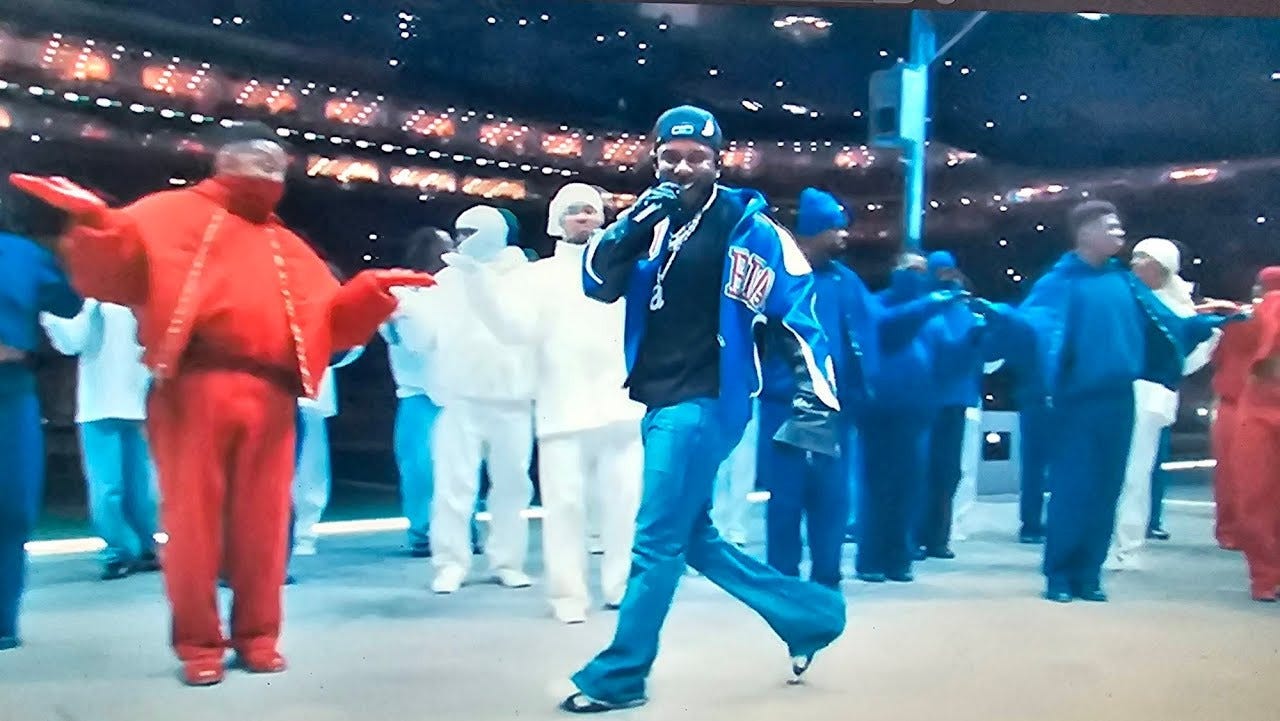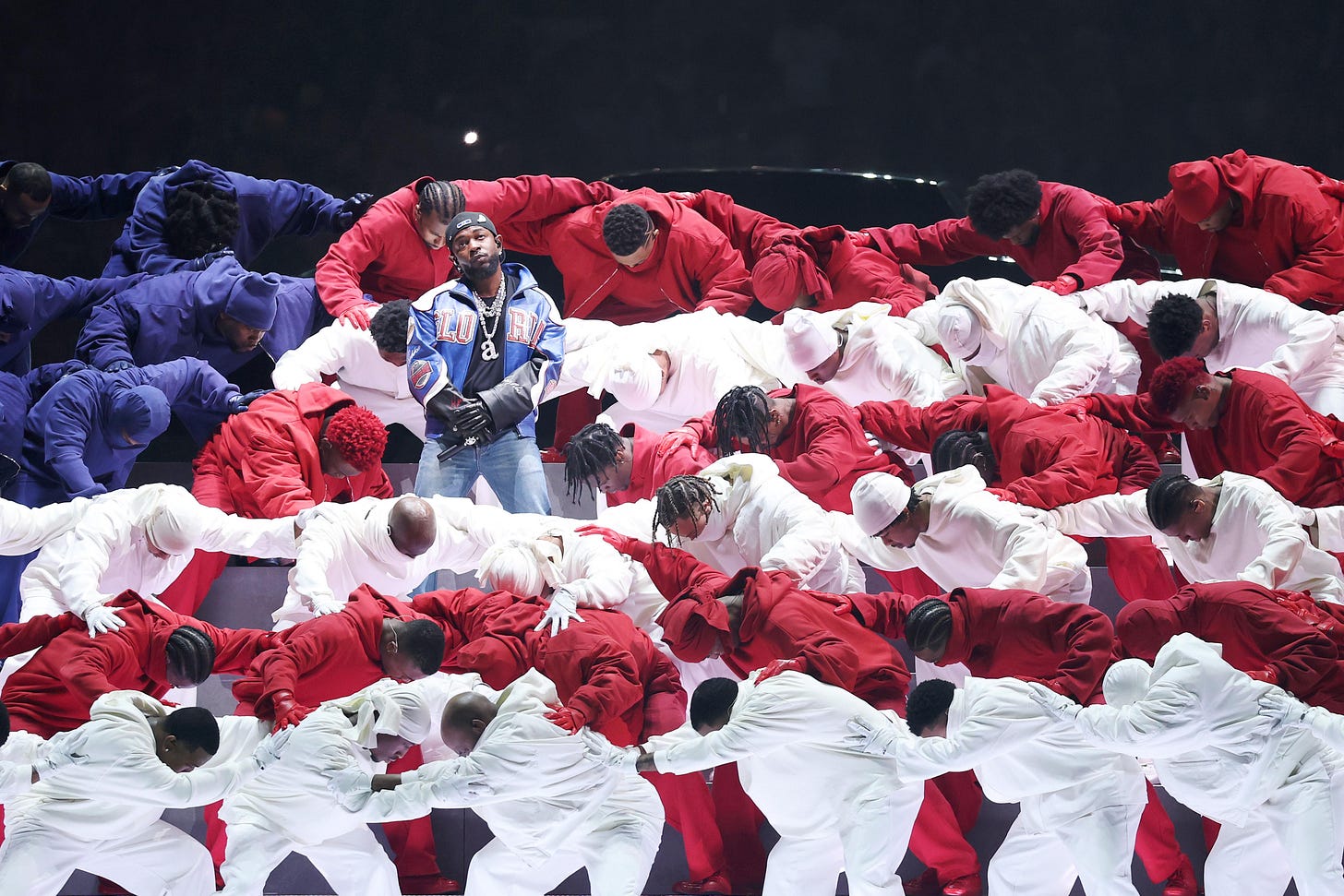Care, Support & Infrastructure (Black Creative Worlds: Week Four)
Kendrick Lamar is a black data moodboard
Purchase Jessica Marie Johnson, David Mimno, and Lauren Tilton, eds., Computational Humanities (Minneapolis: Univ Of Minnesota Press, 2024) here and everywhere now.
I don’t know what I planned to write about computational humanities before the murderous halftime show that aired last night. The week was another hard one, mostly because I did not set up the right care infrastructure. I am taking the advice, of course, of everyoneTM online, in movement, and in person to slow the onslaught, don’t get consumed, pick an issue and stick it, control the pace, log off when necessary. I designed Black Creative Worlds for this—analog readings, one hour with no devices, reflective writing, etc.
Except that last week involved planning for three trips, one that ended up rescheduled due to weather, which put me on the computer prepping at a more frantic pace than usual. Except that Witch Baby decided to tear the club up and by club I mean school, after care and day care. Between embarrassing teacher phone calls and dishing out “consequences,” playing emotional care parent wore my boundaries down. Except that the issues I’ve committed to staying present with (resegregation watch, research funding, and education) got slammed last week over and over, ending with a hit on universities via the NIH indirect funding cap, which Greg Pak accurately called “a vote for cancer” (and he has scripts to call your reps and tell them all so).
Being a cancer survivor is like being a rape survivor if you’re a Black woman—even if you aren’t one yourself, pretty much everyone around you is and you know it is a matter of time before it is your turn. Because that is the water we are swimming in—plastic-infested, bloody, and full of predators fed on fantasies of flayed Black flesh.
And before I knew it, the empire’s algo got me. Scroll, scroll, doom, doom, and then this, and this, and this, meeting, triage, phone call, meeting, link share, scary emoji face.
And then…
Suddenly I felt like the T’Challa at the edge of a waterfall, being yelled at by the Queen of Wakanda while hanging upside down from fine ass M’baku’s hips.
SHOW THEM WHO YOU ARE!!!!!
If you haven’t seen the Kendrick concert/halftime show, it should be up to view. And this newsletter isn’t a post-mortem on that performance. The Black pop culture gworls do it better and I’d rather read/view their takes on the socials.
Instead, this is me confirming READ RECEIPT on the love note Kendrick sent Black folks and the world. A note that reached me despite disappearing from Twitter, despite doom scrolling, despite algorithms and corporate ownership and the drama that is the NFL. It reached me through group chats, screenshots, and even some in person kking with my partner, cutting right through the 2025 grey haze.
What is it about Black culture, our culture, that saves our lives? After all, I’m not the biggest Kendrick fan. I wasn’t on the “Not Like Us” wave (I actually prefer “euphoria” and still keep it on repeat). I am not from the West Coast, I don’t like Los Angeles, and as much as I love hip hop, there aren’t enough blue pills that will make me forget the Dee Barnes story so I never got into N. W. A. or any West Coast rap. But in an IG live on the election, Nelini Stamp said something I think about a lot: “It’s time to get serious about culture…culture is art, but also culture is shared experiences.”
The shared experience of internationally hating on Drake, but really also hating on 47, but really also hating on these United States of America with all her footballs and slavery, doctrine of Discovery and petrochemicals, moonlight and magnolias, and rotting bodies around the world…yes. That hate is delicious. That hate is power. We can put that hate in an IV and let it drip.
That American flag made up of Black masc figures in red, white, and blue did a lot of work last night. As did kdot sitting in the middle of it all. That flag was a Black data moodboard and I hadn’t seen one blaze so bright since Kara Walker built herself a Sugar Sphinx/A Subtlety.
And I didn’t miss the he doth protest too much (like Kendrick didn’t let him up on that stage, be serious) protestor waving the Sudan and Palestine flags. YES.
Computational humanities is a very dry term to some. Listen, all it means is we want to talk about what gets counted and how we know what all that counting means. And we (Tilton, Mimno and I) want to do it with an eye towards care and support and revising the known world.
These days, there is a lot of talk about flows and floods and shock and awe. In the way we live now, on screens, on devices, and in person, the shock and awe is computational. It is Big Data. And everything happening right now is also generating data that could get Big. This post. That halftime show. The images circulating. The alt-text. From music notes to pixels to page views, data is being collected, catalogued, and compiled, somewhere. And if it is compiled in machine readable form, most likely it is quantifiable and, because this is all happening at lightning speed these days, most likely it is already being quantified.
And, yes, the quantification is increasingly opaque and dangerously proprietary (i.e. AI).
But none of that is actually us, ya know? AI isn’t culture. A dataset isn’t culture. Alt-text isnt culture. Neither are filenames or timestamps or visualizations. You still need people, in the end. And you still need the social. And you still need to reckon with power. Culture doesn’t exist without people, without the shared experience, the social relations we forge over and under and with culture. The human, in all her tempestuous, denied, greedy, confounded and confounding limitations.
Which also means the culture will never really sit still long enough for the machines to catch her.
The Muskies are attempting to bomb the culture in a "keep this nigger-boy running," kind of way. Big Data. What they are doing is clumsy, flimsy, and illegal, but not ineffective if we act as individuals.
But I am we, and we remain unquantifiable, legion. We continue to falling in love with ourselves and with each other. We continue to remind ourselves to SHOW THEM WHO WE ARE. We continue to move in a the people could fly kind of way. In a, just when you think you’ve caught her, out of nowhere, the culture will sprout wings and take to the sky kind of way. In a, we will tell the story of this moment, and that story will cripwalk all over your fucking face how do you like them apples black Uncle Sam jazz hands kind of way.
On Tuesday (tomorrow), come hear from some of the contributors and learn more about how we are thinking about literature, history, culture, data, infrastructure, labor, funding, and power.
Whether you can join us or not, do something to resist this week. Oh, the week’s questions and readings are below.
Week 4 - February 11 - Computational Humanities Book Celebration with Roopika Risam, Vanessa Holden, Joshua Rothman and Crystal Eddins
Lauren Tilton, David Mimno, and Jessica Marie Johnson, eds., Computational Humanities (Minneapolis: Univ Of Minnesota Press, 2024)
“Emergent Strategies and Abolition,” Andrea Ritchie, Practicing New Worlds: Abolition and Emergent Strategies (La Vergne: AK Press, 2023).
Discussion Questions
Four weeks in, return to Ruha Benjamin’s provocation two weeks ago: How do you know if you are dreaming your own or someone else’s dreams?
Read the terms of service of your favorite social media platform. Do you understand where your data is going?
What is data? How do you define it? Miriam Posner has a great definition, but is it the same as yours?
Black folks have created worlds using data, challenging data, and disappearing from data collectors. Think of some examples of each.
What does infrastructure mean to you?
Suggested Readings
adrienne maree brown and Autumn Brown, “Post-Election Time with Nelini Stamp,” How to Survive the End of the World, accessed February 9, 2025, https://endoftheworldshow.org/episodes/post-election-time-with-nelini-stamp.
Kim Gallon, “Synthetic Data and Health Equity,” accessed January 27, 2025, https://just-tech.ssrc.org/field-reviews/synthetic-data-and-health-equity/.
Catherine D’Ignazio and Lauren F. Klein, Data Feminism (Cambridge, Massachusetts: The MIT Press, 2020).
Peace Ossom-Williamson and Kenton Rambsy, The Data Notebook (Mavs Open Press, 2021), https://uta.pressbooks.pub/datanotebook/.
Shaka McGlotten, “Black Data,” in No Tea, No Shade: New Writings in Black Queer Studies, ed. E. Patrick Johnson (Durham: Duke University Press, 2016), https://read.dukeupress.edu/books/book/23/chapter/97539/Black-Data.
Dong Nguyen et al., “How We Do Things With Words: Analyzing Text as Social and Cultural Data,” Frontiers in Artificial Intelligence 3 (2020): 62, https://doi.org/10.3389/frai.2020.00062.
“Finding Runaway Slaves: Freedom on the Move and the Databasing of Fugitive Slave Advertisements from North American Newspapers,” Process: A Blog for American History (blog), June 9, 2016, http://www.processhistory.org/freedom-on-the-move/.
Whitney Battle-Baptiste and Britt Rusert, eds., W. E. B. Du Bois’s Data Portraits: Visualizing Black America (Amherst, Mass. : Hudson, NY: Princeton Architectural Press, 2018).
Autumn Womack, The Matter of Black Living: The Aesthetic Experiment of Racial Data, 1880–1930 (The University of Chicago Press, 2022).
Joan Mukogosi, “Establishing Vigiliant Care: Data Infrastructures and the Black Birthing Experience” (Data & Society Research Institute, July 10, 2024), https://datasociety.net/library/establishing-vigilant-care/.
CDCS Annual Lecture 2024: Alex Gil “The Point Is Still To Change It: On Doing Better Than Best Practices in Data Work for Culture and Society,” 2025, https://media.ed.ac.uk/media/CDCS+Annual+Lecture+2024%3A+Alex+Gil+%22The+Point+is+Still+To+Change+It%3A+On+Doing+Better+Than+Best+Practices+in+Data+Work+for+Culture+and+Society%22/1_ew9wipxz.
Treva B. Lindsey and Jessica Marie Johnson, “Searching for Climax: Black Erotic Lives in Slavery and Freedom,” Meridians 12, no. 2 (2014): 169–95.
Miriam Posner, “Humanities Data: A Necessary Contradiction – Miriam Posner’s Blog,” June 25, 2015, https://miriamposner.com/blog/humanities-data-a-necessary-contradiction/.










